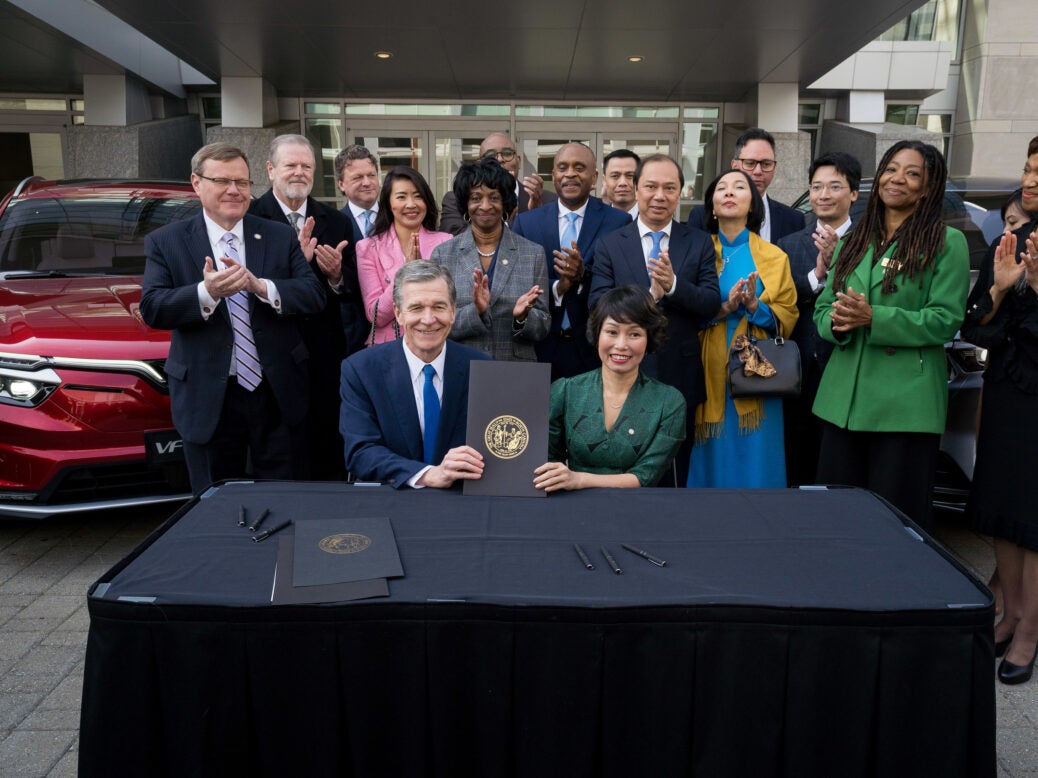
VinFast and the state of North Carolina in the United States have announced the signing of the memorandum of understanding (MOU) for the establishment of a manufacturing plant. The company intends to invest up to $2 billion in the project’s phase 1, creating thousands of jobs.
VinFast’s factory will create a major manufacturing centre in Chatham County’s ‘Triangle Innovation Point’ site, covering an area of 800-hectares, with 3 main areas: electric cars and buses production and assembly, EV batteries production and ancillary industries for suppliers.
Construction for phase 1 of the factory will start in 2022 after a construction permit is granted and production is expected to start in July, 2024.
The capacity of phase 1 is expected to be 150,000 vehicles per year. According to the MOU, VinFast will continue to invest in this factory in future phases. Vehicles to be produced at the site include the VinFast VF 9, a 7-passenger all-electric Sport Utility Vehicle (SUV) and the VinFast VF 8, a 5-passenger, all-electric mid-size SUV.
“North Carolina is quickly becoming the center of our country’s emerging, clean energy economy,” said North Carolina Governor Roy Cooper. “VinFast’s transformative project will bring many good jobs to our state, along with a healthier environment as more electric vehicles take to the road to help us reduce greenhouse gas emissions.”
This project will generate thousands of jobs for local communities. The North Carolina Department of Commerce coordinated the state’s recruitment of VinFast, which also involved state, regional, and local organizations.
“Automotive assembly plants are incredible engines for economic growth, due to the positive ripple effects they create across a region’s economy,” said North Carolina Commerce Secretary Machelle Baker Sanders. “I’m so pleased that VinFast has decided to launch their North America manufacturing operations from our state, and we’ll work hard to make sure they find the skilled workforce they’ll need to grow and thrive in North Carolina.”
The company suggested last November it plans to eventually invest a total of US$6bn in the USA to tap in to fast-growing demand for EVs.
VinFast also said it has received export orders for 50,000 VF8 and VF9 EV models and plans to begin shipments in late 2022, initially to Canada, USA, France, Germany and the Netherlands.
The company also plans to begin construction of an EV battery plant in the central Vietnamese province of Ha Tinh by the end of 2022.
VinFast, founded in 2017, is headquartered in Hanoi, Vietnam. Its vehicle production facility in Haiphong, Vietnam, is planned to have the capacity to produce 950,000 vehicles per year by 2026.
“North Carolina’s strong commitments in building a clean energy economy, fighting climate change and reducing greenhouse gas emissions in transportation make it an ideal location for VinFast to develop its premium, smart and environmentally friendly EVs,” said Le Thi Thu Thuy, Vingroup Vice Chair and VinFast Global CEO. “Having a production facility right in the market will help VinFast to proactively manage its supply chain, maintain stabilized prices and shorten product supply time, making VinFast’s Evs more accessible to customers, contributing to the realization of local environmental improvement goals.”
Recently, Vingroup started construction of a battery plant in Ha Tinh, Vietnam on a 8 hectare plot for phase 1, with a capacity of 5 gigawatt hours (GWh) per year. The facility is expected to be fully installed and running at full capacity from late 2022.
Last November, VinFast announced the VF 8 and VF 9 (previously introduced as VF e35 and VF e36) at the 2021 Los Angeles Auto Show. The EV maker also introduced three new EVs (VF 5, VF 6 and VF 7) at the 2022 Consumer Electronics Show (CES).
COMMENT
VinFast’s US investment plan is seen as extremely ambitious, given how other local EV startups such as Fisker Automotive and Faraday struggled to implement their business plans. The company began vehicle production of 2018 at a newly built plant in the port-city of Haiphong in Northern Vietnam and sold just 35,723 vehicles domestically last year. It only began EV deliveries last December, with almost all of its sales to-date being petrol-powered vehicles based on BMW-licensed technology.
